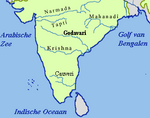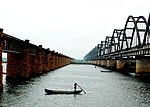Manjira River
This article needs additional citations for verification. (August 2023) |
| Manjara River | |
|---|---|
 Manjara rivercourse visible in top half. | |
| Location | |
| Country | India |
| State | Maharashtra, Karnataka, Telangana |
| Physical characteristics | |
| Source | |
| • location | Maharashtra, India |
| Mouth | Godavari River |
• location | Sangam, Maharashtra, India |
| Length | 724 km (450 mi) |
| Basin size | 30,844 km2 (11,909 sq mi) |
| Discharge | |
| • location | Sangam |
The Manjara River (also spelled Manjara in
Description
The river's origin is near the Gavalwadi village of the Beed district. The river flows from the northern boundaries of the Osmanabad district, cutting across the Latur district, goes to the Bidar district and finally Telangana. It flows on the Balaghat plateau along with its tributaries: Terna, Tawarja and Gharni. The other three tributaries of Manjara are Manyad, Teru and Lendi which flow on the northern plains.
The river, in the first two thirds of its length generally flows from west to east, until the Sangareddy town in Telangana, little northerly to which it changes its course and flows north. The final stretch of the river forms the border between Maharashtra to the west and Telangana to the east. The Manjira River, along with the Haridra River merges with the Godavari River at the border, with Dharmabad of Maharashtra, westerly and Kandakurthi south-easterly in Telangana. This Triveni Sangam is sacred for Hindus.
Tributaries
- Terna River: This is the main tributary of Manjara which flows on the southern boundary of the Ausa Taluka.
- Manyad: This river takes its origin at Dharmapuri in Beed district and flows through the Ahmadpur Taluka in Latur district.
- Lendi: The river has its origin in Udgir Taluka and flowing through the Ahmadpur Taluka joins the Tiru river in Nanded district.
- Gharni: The river has its origin near Wadval and flows through Chakur Taluka.
- Tawarja: Tawarja originates near Murud in Latur Taluka and joins the Manjara river at Shivani on the Latur-Ausa boundary.[2]
Buildings
Morgi is a village with a population of 1015. It is located in
The
The
Environment
In the late 20th and early 21st centuries the upper reaches of the Manjira in Maharashtra suffered environmental degradation which increased run-off, as opposed to ground water recharge, and increased erosion and silting.[4][5][6]
References
- ^ "River Systems Of Karnataka". Irrigation Dept. of Karnataka. Archived from the original on 16 July 2012. Retrieved 19 August 2023.
- ^ "District Profile". Latur District Official Website. Archived from the original on 30 March 2018. Retrieved 19 August 2023.
- ^ "Morgi Post Office". iCBSE. Retrieved 19 August 2023.
- ^ "In dry Latur, villagers revive a dead river". The Times of India. 10 May 2016. Archived from the original on 12 May 2016. Retrieved 19 August 2023.
- ^ "Latur Drinking Water Crisis highlights absence of Water Allocation Policy and Management". South Asia Network on Dams, Rivers and People. 20 April 2016.
- ^ Gokhale, Nihar (8 September 2015). "Water supply once a month: lessons to be learnt from Latur". Catch News (Rajasthan Patrika Group). Archived from the original on 11 September 2015. Retrieved 19 August 2023.




